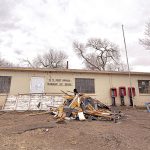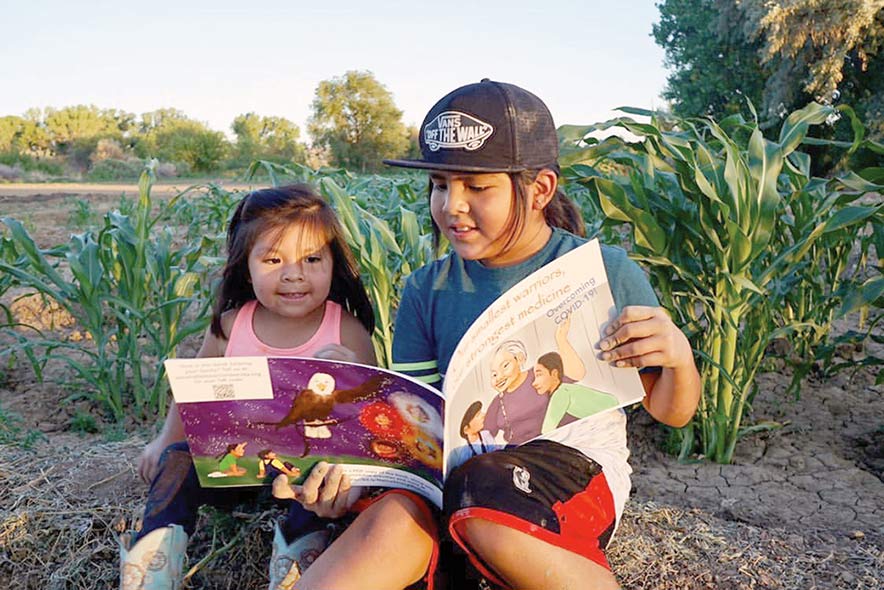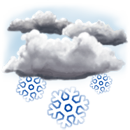
A book for kids: Story focuses on ‘smallest warriors’ to teach about virus

Courtesy photo | Joshua Allison-Burbank, John Hopkins Center
Kateri Allison-Burbank, left, and Kaleb Allison-Burbank read “Our Smallest Warriors, Our Strongest Medicine: Overcoming COVID-19.”
By Stacy Thacker
Special to the Times
CRYSTAL, N.M.
Understanding a pandemic and how the coronavirus is impacting communities can be overwhelming and complicated, especially for children.
In an effort to educate and help children understand the world they are currently living in, the Johns Hopkins Center for American Indian Health developed a book that targets Indigenous communities across the United States and Canada.
The story, “Our Smallest Warriors, Our Strongest Medicine: Overcoming COVID-19,” follows twins Virgil and Tara as they begin to learn more about the virus and why it’s important to wear a mask and wash their hands.
Through dreams, the twins go on a journey to see how the virus has affected their friends and family. Along the way they learn helpful tips to stay safe and start to understand why they can’t visit relatives just yet and why their mom’s work as a nurse is so important.
“This book aims to provide public health education, strength based coping tools and above all hope for Indigenous children and families during this pandemic,” said Victoria O’Keefe.
O’Keefe is a member of the Cherokee and Seminole nations of Oklahoma as well as a psychologist. She works with the Center for American Indian Health and said the book is designed to “provide tribal communities with access to supportive and culturally responsive resources.”
The story was adapted from “My Hero is You,” a children’s book that also teaches kids about Covid-19 and was developed by the Inter-Agency Standing Committee Reference Group on Mental Health and Psychosocial Support in Emergency Settings.
In adapting the book for a Native American audience, a work group made up of representatives from 12 tribes, including experts in child development, metal health and health providers, helped create a book that followed health information from the Centers for Disease Control and Prevention while also making it culturally relevant.
As a public service, the Navajo Times is making all coverage of the coronavirus pandemic fully available on its website. Please support the Times by subscribing.
How to protect yourself and others.
Why masks work. Which masks are best.
Resources for coronavirus assistance
The coronavirus is impacting more than physical health and they wanted to make sure the book addressed that.
“It’s taking such a toll on mental health and spiritual health for families and communities,” she said. “Not being able to connect with loved ones or friends or community or having tribal gatherings or ceremonies that can impact our mental health and spiritual health.”
Not only are family and community members being taken by the virus but everyday tasks such as grocery shopping or going to school have changed.
“So this book really acts as a starting place for families to come together to talk about this pandemic, to talk about coping strategies with each other and cope with all of these impacts that they’re experiencing,” O’Keefe said.
The book was released about a month ago and during the first few days of the launch they reached 50,000 people through Facebook. Since then they’ve had 100,000-plus social media engagements when they post about the book.
For those who don’t have access to the internet or social media, they’ve been able to deliver more than 11,000 books through wellness boxes and care packages, O’Keefe said.
Books are being shipped to U.S. Indian Health Service units, tribal departments, tribal organizations and urban Native American health centers across the country.
About 1,200 books have been distributed on the Navajo Nation and after partnering with UNICEF USA, an additional 25,000 more books will be distributed across Indian Country with 10,000 of those going to the Navajo Nation, O’Keefe said.
The feedback from the community has been positive. They’ve heard from caregivers that the book helped their kids understand why they needed to wear a mask and made kids proud to wear them.
The feedback is helpful for the Center for American Indian Health and they encourage readers to let me know how the book has helped them.
With feedback from her own children, Crystal Kee, the story line writer and program consultant for the Center for American Indian Health, related the story back to questions and experiences children might be having.
Kee, Diné, said the storyline took her about three or four days to write but a lot of research went into it. She had to develop a common theme between all tribes and landed on powwows. She also wanted to balance the male and female roles so she decided to make the twins one of each gender.
Kee also had to make sure the lessons were relevant and reflected readers from Indigenous communities.
While creating the title, she said children are a strong medicine and they hold a lot of strength and power. Children are honest and it’s important to give them room in this pandemic conversation.
“Sometimes children are forgotten in the mix but their feelings and their perspectives are just as important, if not more important, because their exposure to what is happening around them really determines or shapes how they behave and how they think,” she said.
The book is designed to be read to children by their caretaker so they can help explain situations that might relate to their personal lives and together they can learn about the virus and why it’s important to take certain precautions.
Sometimes it’s easier and more comfortable to talk about situations in a form where children don’t feel put on the spot. Using Tara and Virgil as examples is a good way to start the conversation, Kee said.
“Children do develop fears, children do develop anxiety and stress especially when things are happening around them and they don’t know what it is,” Kee said. “They know something is off, they know that there is a lot of verbiage about covid, but what is it?”
Kee said the virus is not going to be gone with a snap of a finger so it’s vital to talk about how to live life in the best way possible during this time where the virus has created temporary ways of life.
But it’s also important to focus on lessons this experience could leave behind, like slowing down and having dinner with your family or continuing to be kind to each other and to the earth.
The book can be found online at: https://bit.ly/SmallestWarriorsBook
More resources can be found at: https://bit.ly/NativeStrongMedicine








 Highway 264,
Highway 264, I-40, WB @ Winslow
I-40, WB @ Winslow